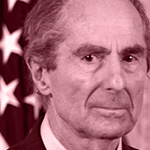Philip Roth
(1933 - 2018)

Philip Milton Roth was a Jewish American novelist.
Roth (born March 19, 1933) was born in Newark, New Jersey. After graduating from high school at the age of 16, Roth went on to attend Bucknell University, and earned a B.A. in English in 1954. He then pursued graduate studies at the University of Chicago, receiving a M.A. in English literature. He first began a writing career as a film critic for The Nation. Roth went on to teach creative writing at the University of Iowa and Princeton University. He continued his teaching career at the University of Pennsylvania where he taught comparative literature until his retirement in 1992.
Roth published his first book Goodbye, Columbus., in 1959. It won the prestigious National Book Award in 1960, and afterward he published two long, bleak novels, Letting Go (1962) and When She Was Good (1967); it was not until the publication of his third novel, Portnoy's Complaint, in 1969 that Roth enjoyed widespread success. In many of Roth’s books he utilizes his own past of the suburban and urban American Jewish communities; nevertheless, some of his depictions infuriate his fellow Jews with the portrait he displays.
During the 1970s, Roth experimented in various modes, from the political satire with Our Gang, to the fantasy realm with The Breast.. By the end of the decade, though, Roth had created his Nathan Zuckerman alter-ego. In a series of highly self-referential novels that came between 1979 and 1986, Zuckerman appeared as either the main character or as an interlocutor.
Critics generally regard Roth’s golden period as commencing with Operation Shylock: A Confession and continuing to the present day. In 1995, Roth published the Sabbath's Theater, considered a comic masterpiece. He is perhaps best known for his late-1990s trilogy comprising the Pulitzer Prize-winning American Pastoral (1997), I Married a Communist (1998), and The Human Stain (2000).
Philip Roth is arguably the most decorated American writer of his era. Two of his works of fiction have won the National Book Award; two others were finalists. Two have won the National Book Critics Circle awards; again, another two were finalists. He has also won two PEN/Faulkner Awards and a Pulitzer Prize for Fiction. In 2001, The Human Stain was awarded the United Kingdom’s WH Smith Literary Award for the best book of the year. In 2002, he was awarded the National Book Foundation’s Award for Distinguished Contribution to American Letters. His 2004 novel, The Plot Against America, won the Sidewise Award for Alternate History in 2005, as well as the Society of American Historians’ prize and again the W.H. Smith Literary Award. In May 2006, he was given the PEN/Nabokov Award.
Roth was awarded the 2010 National Humanities Medal by U.S. President Barack Obama. In May 2011, Roth was awarded the Man Booker International Prize for lifetime achievement in fiction on the world stage, the fourth winner of the biennial prize. In 2012, he received the "Prince of Asturias prize" for literature and in January 2014 he was named to the Top 5 Most Influential Jews in the United States by Forward magazine.
Roth died in a Manhattan, NY hospital at the age of 85 on May 22, 2018.
Sources: American Jewish Desk Reference; Wikipedia


